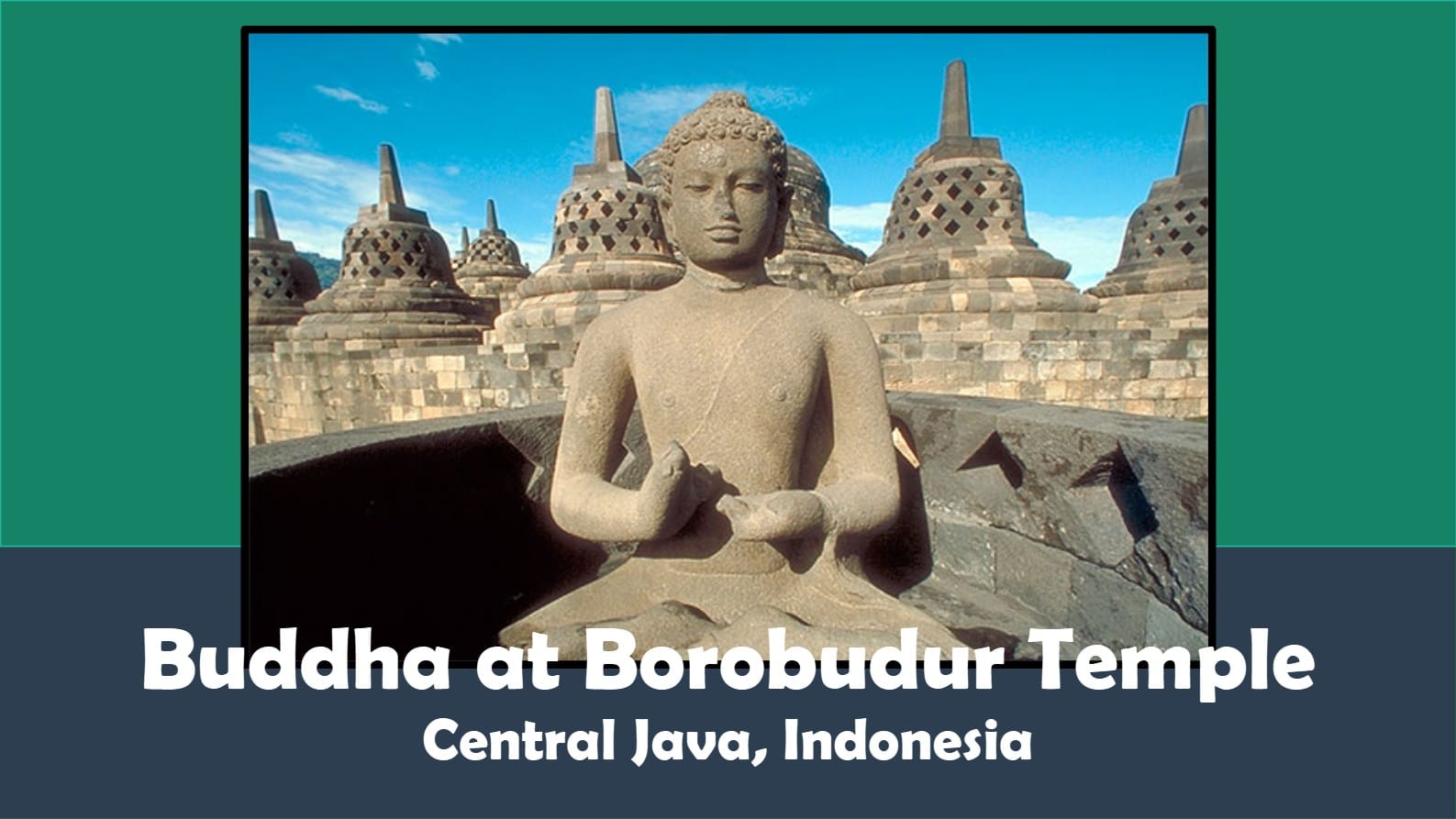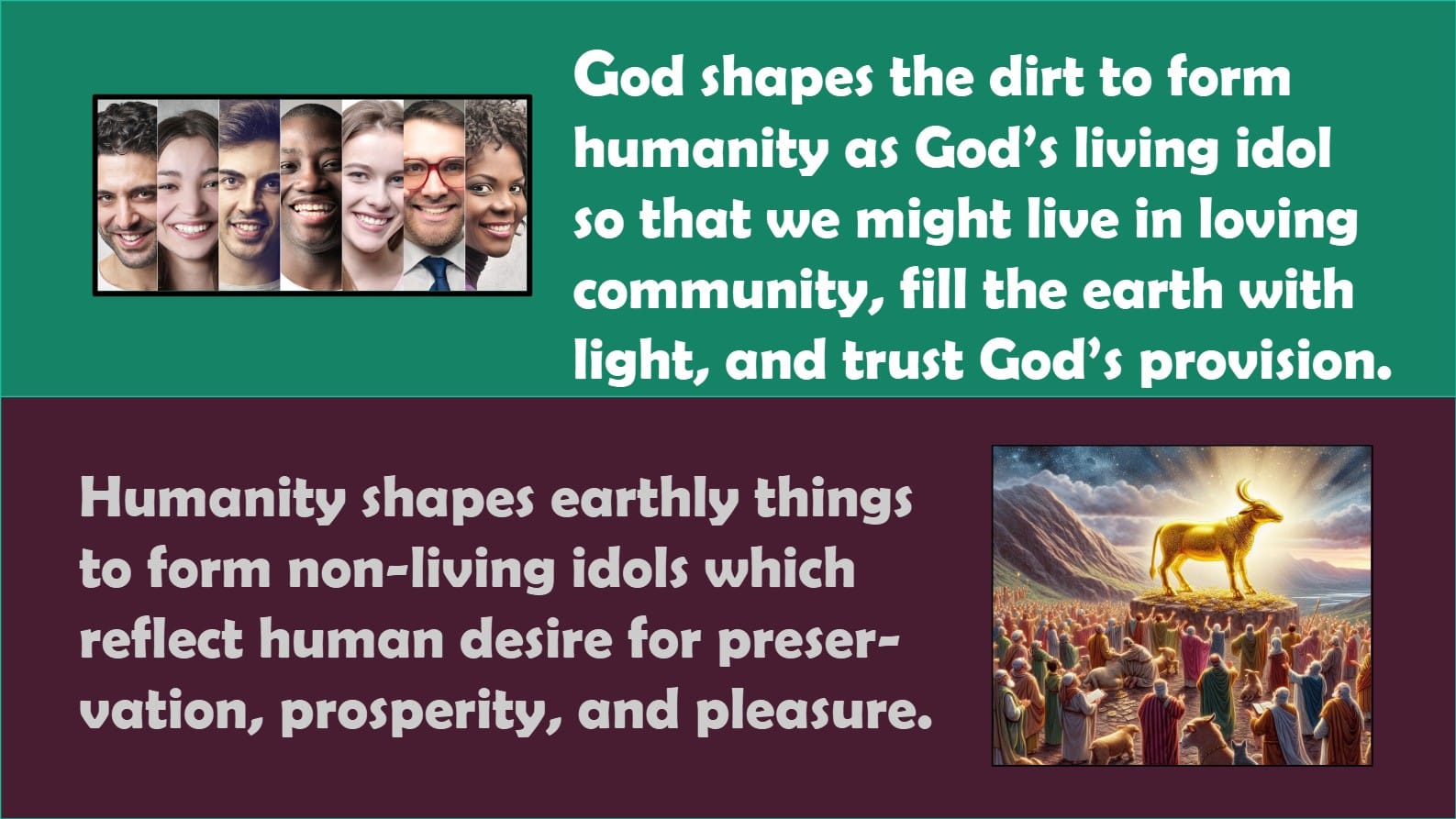Living Idols of God

What comes to mind when you think of idols?
Perhaps you envision the golden calf from Exodus 32, where the Israelites, impatient for Moses' return from Mount Sinai, melted down their gold to create an idol. Moses returned, and he was not happy. The Ten Commandments explicitly warn us against creating images or idols.
Idols have been common throughout history, from the golden calf to the carved statues at Borobudur Temple in Central Java, Indonesia. This 8th-9th century Buddhist temple, the largest in the world, is filled with carved images depicting the story of Buddha, similar to Sunday School lessons. Pilgrims climb the temple, aiming to reach Nirvana, passing 72 stupas, each containing a Buddha carved from stone.

Idols in the Bible
Idols are frequently mentioned in the Bible. Numbers 33:52b (NIV) instructs,
"Destroy all their carved images and their cast idols (tselem), and demolish all their high places." Pay attention to the word "tselem."
Psalm 115:4-8 (NIV) says,
"Our God is in heaven—
he can do whatever he wants!
Their idols are just silver and gold—
things made by human hands (adam, from adama).
They have mouths, but they can’t speak.
They have eyes, but they can’t see.
They have ears, but they can’t hear.
They have noses, but they can’t smell.
They have hands, but they can’t feel.
They have feet, but they can’t walk.
They can’t even make a noise in their throats!"
Idols are problematic because they are not real. They take the place of God in the heavens and are made from the earthy stuff, just like humans. In essence, worshiping idols is akin to worshiping ourselves. Idols offer false hope and a false sense of safety.
Genesis and Creation
Let's compare what we've read to the creation story in Genesis 1. Genesis 1:26 states,
"Then God said, 'Let us make humanity (adam) in our image to resemble us (tselem)."
When people make idols, they take earthy stuff (adama) and shape into the form of something – an animal or human-like figure, usually.
In Genesis, God takes earthy stuff (adama), forms people, and breathes His Spirit into them. We are made in God's image, tselem, making us His idols.
This likely sounds strange and feels weird, but let's revisit Psalm 115:4-8. Idols made by human hands do not speak because they represent gods that cannot speak. However, as living idols made by our Creator, we can speak truth, share hope, and talk about the good news because we represent a God who speaks.
Idols made by human hands cannot hear because they represent gods that cannot hear. As living idols of God, we can hear the Spirit speaking and listen to the hearts and stories of those around us because we represent a God who hears our prayers and the cries of those in need.
We represent the Most-loving, Most-gracious, Most-holy, and Most-powerful God, our heavenly Father, who breathed life into dirt and mud, creating people in His likeness and image. We are living idols representing a living God who speaks, sees, hears, smells, feels, and walks. We live and breathe because we are idols of a living and breathing God who speaks, listens, and moves. That's reason enough to make a joyful noise to the LORD!

God's Intention and Our Temptation
In Genesis, God shapes the dirt (adama) to form humanity (adam) as His living idols (tselem) so that we might live in loving community with each other, fill the earth with light, and trust God's provision.
But when the serpent tempts us to question God's words, love, and provision, we end up shaping earthly things (adama) to form non-living idols (tselem) that reflect our desires for preservation, prosperity, and pleasure. We trade God's desires for our own, placing ourselves in His position and creating idols that reflect ourselves.
Reflecting on Our Idolatry
Are you living as God's idol, or have you created shrines to other gods in your heart? Most of us don't have literal idols in our homes, but 21st-century idols are real. They turn our attention from God's plans and purpose to our desires.
Contemporary idols are anything that causes you to think, speak, or act in unChristlike ways. They damage relationships and community, dim our light, confuse our purpose, and lead us to turn away from God's provision.
Some common 21st-century idols include:
- Hobbies/Pastimes: Not inherently wrong but can become obsessions.
- Sports Fandom: Consumes time and attention.
- Social Media: Leads to unChristlike behavior.
- Relationships: They can become idols when they take precedence over God.
- Material Possessions: Valued over spiritual wealth.
- Money and Stuff: Pursued at the expense of spiritual growth.
- Power and Politics: Sought after more than God's will.
- Fame and Celebrity: Idolized instead of God.
- Career and Work: Prioritized over spiritual duties.
- Friends and Family: Loved more than God.
- Church and Ministry: They can become idols if they overshadow a personal relationship with God.
Most of these things are not inherently wrong. But if they cause us to think, speak, or act in unChristlike ways, they become idols.

Gardening and Spiritual Growth
A couple of years ago, I wanted to plant a garden. The garden plot in the back corner of our yard was formless, void, and empty, much like the world in Genesis 1:2. Like our Creator, I transformed the plot from empty and formless to something that could thrive and bear fruit.
After six days of toil, I rested. Actually, I don't think it took a full six days...and I probably rested more than I worked. But you get the picture.
In Idaho, achieving a fruitful garden is no small feat. I have been partially successful, growing tomatoes, squash, pumpkin, watermelon, basil, cilantro, lettuce, zucchini, and chili peppers. However, I also dealt with weeds.
How often do I need to weed, water, and remove rocks from the garden?
Regularly, right? Neglecting these tasks leads to a dry, cracked garden with no fruit. Similarly, idols in our lives are like rocks and weeds. We must continually till the soil of our hearts, removing rocks, watering and nourishing our souls, and practicing God-honoring, Christlike habits.
Ignoring the rocks and weeds in our spiritual lives leads to a dry, fruitless Christian life. Jesus said that an unfruitful tree is worthless. We don't want to be unfruitful and worthless.
Conclusion
What are the idols in your life?
What rocks need to be removed, and where does your heart need weeding and watering?
We all wrestle with these questions, and the answers change with each season of life as circumstances change and we grow in Christ.
It's hard, but our heavenly Father hears our prayers and promises to be with us each step of the way. Our Savior, Jesus Christ, offers forgiveness and new life. The Holy Spirit strengthens, encourages, and guides us, giving us the power to overcome and break free.
If you are a child of God, saved and forgiven, I invite you to sing a song of surrender. If the Holy Spirit is speaking to you about an idol in your life, come forward and lay it on the altar. When you get up, leave the idol there. Please don't take it back home with you.
Together, let's strive to live as true idols of the living God, representing Him in our words, actions, and lives. Amen.





Member discussion